English Words in Action, Group M
(a variety of English words which have developed through history and are currently used in our modern age)
Simply click on this banner (or the following link) and you will be on your way to stimulate your brain for greater word comprehension with quizzes based on some of the words in this unit.
2. Etymology: from Old French danse macabre, "dance of death"; literally, "dance of the Maccabees". There is much that is macabre in the tale of the Maccabees.
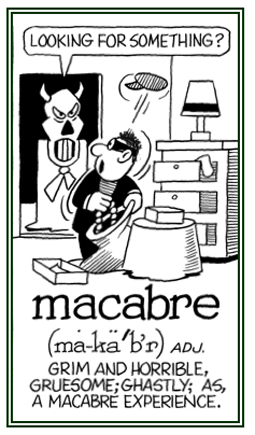
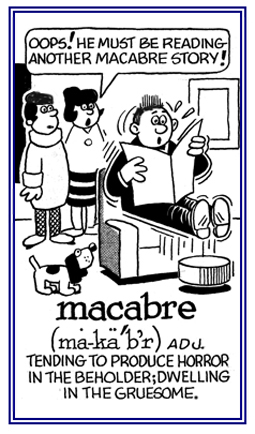
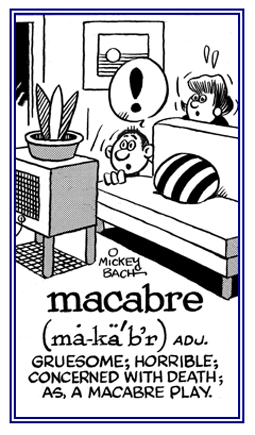
Go to this Word A Day Revisited Index
so you can see more of Mickey Bach's cartoons.
2. Pertaining to grotesque and horrific details of death and decay: The tornadoes macabrely created devastation for many areas.
3. Constituting or including a representation of death; spine-chilling, repulsive, or ghastly: The book macabrely described the "criminal history of mankind".
In his Machiavellian view, it is suggested that a prince should be concerned only with power and be bound only by rules that would lead to success in political activities.
As an Italian historian, statesman, and political philosopher; Machiavelli's amoral and Machiavellian writings about political actions have resulted in his name being a synonym for "cunning" and "duplicity".
2. Etymology: from the name of the Florentine diplomat Niccolò Machiavelli (1469-1527) whose book, The Prince, outlined ruthless ways to get and to keep political power.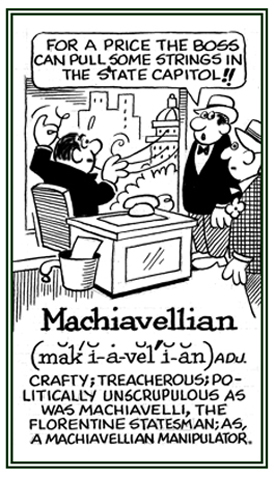
Go to this Word A Day Revisited Index
so you can see more of Mickey Bach's cartoons.
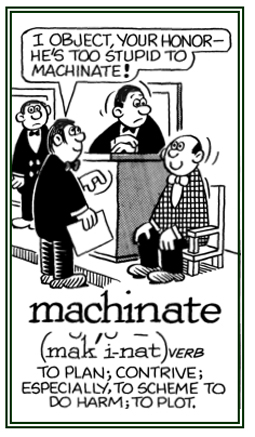
Go to this Word A Day Revisited Index
so you can see more of Mickey Bach's cartoons.

Go to this Word A Day Revisited Index
so you can see more of Mickey Bach's cartoons.
2. An organization of individuals dedicated to or committed to working together to achieve a desired end, often with political overtones: The mayor has a political machine working for his reelection.
3. Etymology: such words as, machine, machinery, and machination come from Greek mechane, "device, instrument, means". The same Greek element is the source of mechanical and mechanics.
2. The organization or structure of a system that enables the system to function: The teachers are defying the machinery of local government authorities as it relates to school staff evaluations and salaries.
2. Etymology: from Greek makros, "great, large" + cosmos, "world, universe", which also includes cosmic, cosmos, and cosmopolitan; "at home anywhere in the world"; as well as, microcosm, literally "little world".
2. Suffering from a disorder of the mind; insane, deranged: Van Gogh is reported to have had periods during which he was completely mad.
3. Marked or described as temporarily experiencing violent emotions, ideas, or behavior: Susanne was mad with jealousy when she saw her boyfriend talking with another girl.
4. Lacking restraint or reason; foolish: Jerome was mad to have hired both of those guys.
5. Foolish, impassioned, or demonstrating a strong attraction to someone or something: Ben's daughter was mad about sports.
6. Marked by extreme excitement, confusion, or agitation: There was a mad scramble for the tickets to the Olympic games.
7. Descriptive of something as amusing, a great deal of fun, hilarious: Dina and Fay had a mad time at the birthday party last night.
8. Affected by rabies; rabid: The neighbors could hear the mad dog howling because of the rabies that it was afflicted with.
For decades, language purists have been telling people that mad refers only to "insanity" and that we should not use it to mean "angry".
Regardless, mad does mean "angry", and expressions; such as, "I'm mad at him" and "She's mad because she wasn't invited to the party" are considered acceptable usages; although using such terms in formal writing might be considered "too informal and less desirable" than using "angry".
9. Etymology: the origin of mad is the shortened form of Old English gemad, "insane".When we remember we are all mad, the mysteries disappear and life stands explained.
2. In an insane manner or action: People were greatly disturbed as the man pulled out a knife and started madly waving it around in a threatening way.
2. An informal usage indicating a man or men who behave in a wild and uncontrolled manner: There are madmen who drive recklessly fast on the roads regardless of the speed limits or the numbers of cars.
2. Behavior or thinking which is very dangerous or foolish: The teenager was thought to be at the height of madness when he was driving so fast through the city streets.
Links to all of the groups of English words in action, Groups A to Z.
You may see the bibliographic list of sources of information for these words in action.

